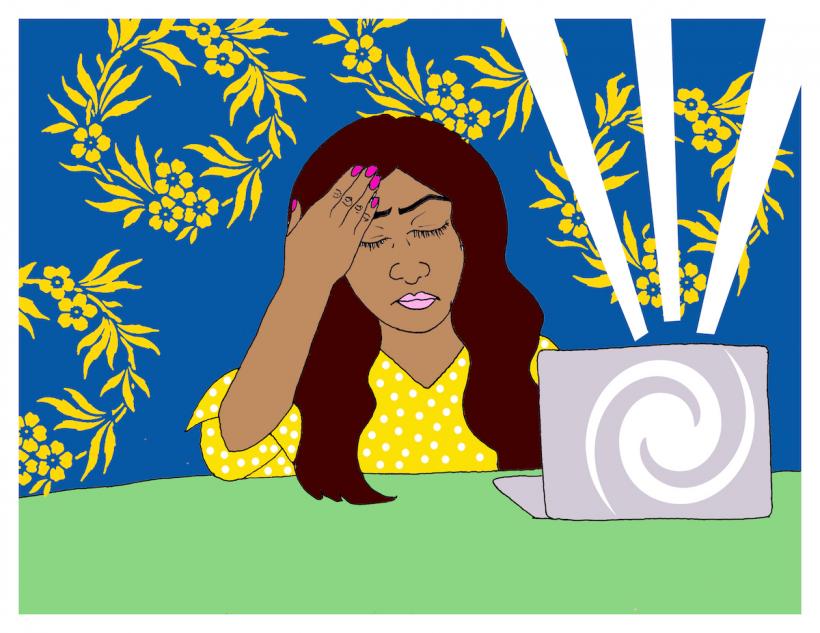
Artwork: Tess Emily Rodriguez
She’s made all the mistakes, so you don’t have to… Ask Erin is a weekly advice column, in which Erin answers your burning questions about anything at all.
Q.
Hi Erin,
I have a new online friendship with Ellie (not her real name). Ellie has a lot going on in her life, more than most. She's a full-time caregiver, and she also has mental health issues with anxiety and depression.
She's not the only friend I have with these issues, and she won't be the last. This is the bit where I am a bitch. I will never say no to her sounding off. She has a lot of stress. But I don't want to spend an entire weekend validating her, reassuring her again and again and again.
It can last for days sometimes. If I don't respond immediately, she sulks and lashes out. Then I get the apologies, and it all starts all over again.
I can't seem to get through to her that I have a family and a full-time job; I can't simply just drop everything.
And frankly, even if I didn't have all that, sometimes I just don't want to.
But it appears that I'm it. She doesn't have much of a life due to her caring responsibilities. She finds it difficult to make friends.
I am not a therapist.
I am not equipped for this — but I can't cut her off because everyone needs someone.
What do I do?
You Might Also Like: Ask Erin: My Friend Always Has To Get Her Way
A.
I understand your tough position. My entire life, even when I was a complete wreck, friends and acquaintances came to me for advice.
I know what it feels like to be the one person someone may be turning to for support, an ear, help.
And that can be exhausting.
Now, with my weekly Ask Erin column, I receive more than 100 emails a week from strangers needing help. I have often felt the pressure and responsibility that comes with that. But I can’t help everyone. I answer one question per week in the column, occasionally more questions in Facebook and Instagram lives, and am working on some other ways to answer a greater number of questions.
I am only one person, and you said something that rings as true for me as it does for you. “I am not a therapist.”
You are not a therapist; it is not your job to fix your friend’s life.
That said, you want to be there for her within reason. But your need to consider your family, your job, and your wellbeing ahead of hers is not akin to you being a bitch. That’s called taking care of yourself. Without doing that, you can’t truly be of service to anyone else.
So how do you handle this? How can you “be there” for a friend without drowning in her drama, however unfortunate her situation may be? In a word — boundaries. A word we are all familiar with but not always adept at implementing.
Why do we have a hard time with boundaries? Many of us, especially women, were raised to be people-pleasers and caregivers. It can take a decent amount of undoing learned behavior. If you set a boundary, you are not a bitch. Nor are you responsible for her reaction to that boundary. I have said this before when discussing boundary-setting and it rings true here too…
PLEASE, don’t ever apologize for asking someone else to respect your boundary.
You can set that boundary with compassion and kindness. Something along the lines of: “I know you are really struggling, and I wish there were more that I could do, but I need to take care of my family and responsibilities right now.”
If she sulks and lashes out, ignore it. If she then comes back with apologies, you can set a new boundary. Something along the lines of, “I understand that you get disappointed when I can’t be there for you in the way that you want me to, but I can’t accept this pattern of lashing out at me and apologizing repeatedly. It’s not healthy for either one of us. If you can’t respect that, I can’t be in your life. I care for you and want to be your friend, but I don’t want us to be stuck in an unhealthy cycle.”
If you don’t set those boundaries, you will need up resenting her. Plus, you’re not helping her by not setting limits.
Lastly, if this seems like a pattern for you with friends, you should address this issue in therapy or a support group like CoDA or Al-Anon.
Get those boundaries up!
The information within Ask Erin should in no way be interpreted as medical advice because I’m not a medical professional. But I am here to help — to share with you the wisdom I’ve gained after years of making mistakes. If you have a question for me about relationships, addiction, dating, friendships, depression, parenting, sex, consent, what I’m watching, what I’m reading, Citrine, or anything at all, use the contact form below or email me: askerin@ravishly.com. As always, your anonymity is golden. Lastly, I’m so excited to share with you my Ask Erin Self-Care Guide, free when you sign up for my weekly newsletter. xoxo







